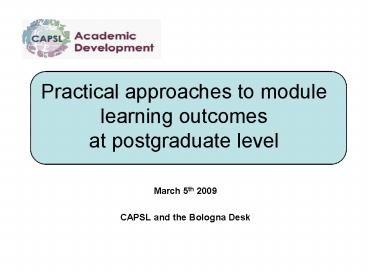Practical approaches to module learning outcomes at postgraduate level - PowerPoint PPT Presentation
1 / 20
Title:
Practical approaches to module learning outcomes at postgraduate level
Description:
Re-drawn from Jenny Moon original. Outcomes and assessment criteria ... From Jenny Moon. An approach to module outcomes and curriculum ... – PowerPoint PPT presentation
Number of Views:25
Avg rating:3.0/5.0
Title: Practical approaches to module learning outcomes at postgraduate level
1
Practical approaches to module learning outcomes
at postgraduate level
- March 5th 2009
- CAPSL and the Bologna Desk
2
Session overview
- Contrast programme and module outcomes
- Module outcomes as curriculum development and
change tools - Introduce a template for use and adaptation
- Supporting others with outcomes-based curricula
3
Contrast programme module outcomes
4
Features of Programme Outcomes
- Written for a broad audience
- Written in context to reference points
- Describe the likely achievements of a typical
student - Provide a generalised overview of the programme
curriculum in terms of generic competences within
a subject specific context - Not directly tested or testable BUT can be mapped
to the outcomes of modules
From Potter, 9th December 2008 event
5
Module vs. Programme Outcomes
- Written for a broad audience
- Written in context to reference points
- Describe the likely achievements of a typical
student - Provide a generalised overview of the programme
curriculum in terms of generic competences within
a subject specific context - Not directly tested or testable BUT can be mapped
to the outcomes of modules
6
4. Describe the knowledge, skills and
competencies that all students will have gained
and demonstrated
- Measurable achievements
- Result from a learning process
- Stated as achievements of the student
- (discipline neutral) examples -
- Critically evaluate research literature
- Present the findings of experimental work
through an oral presentation
7
1. Written for students to read
- An outcomes-based curriculum is focused on
learning and not teaching. - Statements of what a student is expected to
know, - understand and/or be able to demonstrate
after - completion of a process of learning.
- (ECTS Users/ Guide, 2005)
- At the module level, outcomes-curricula
describes - what students will have learnt and demonstrated.
8
Aim vs learning outcome
- Aim
- In this module students will be introduced to the
subject of the core ethical principles in social
work - Learning Outcome
- By the end of this module the learner will be
able to critically apply the core ethical
principles in social work in different case
settings.
From OFarrell, 9th December 2008 event
9
2. Explicitly referenced to assessment
- Assessment involves deciding, collecting and
making judgements about evidence related to
learning.. - Harlen (200410)
- In an outcomes-based curricula it is standard
practice to assess all module outcomes
10
Assessing all outcomes- common misconceptions
- Each outcome has to be assessed by a separate
task - Each outcome should only be assessed once
- Outcomes-based approaches lead to
over-assessment - The same amount of learning effort and
assessment time should be allocated to each
learning outcome
11
3. Written at the threshold level of pass
Re-drawn from Jenny Moon original
12
Outcomes and assessment criteria
- Outcomes describe what students will be able to
do assessment criteria describe how (well) they
should be able to do it. - Clear Assessment Criteria
- 'What do students have to do to get particular
grades or marks?' The clearer the answer you can
find to this question, the greater the
justifiable confidence you will feel in your
ability to assess students work.
13
Measuring competence
- Can do-
- Innovatively
- Using established protocols
- In particular settings
- Quickly
- Efficiently
- With guidance
- Without guidance
- Etc.
Shades of competence Could do Can do Did
once Will do Has done Does seldom Does
sometimes Does often Does usually Does always
14
5. Directly tested through assessment
- Assessment should be valid, reliable and fair.
For example, consider - Does the assessment measure what its supposed to
achievement of the learning outcomes? - Will the same judgement be made, irrespective of
assessor (or occasion)? - Does the assessment disadvantage some, but not
others?
15
Module outcomes as curriculum development
change tools
16
Two views of curriculum
- Teacher perspective objectives teaching
activities assessment - Student perspective assessment learning
activities outcomes
Re-drawn from John Biggs original
17
An approach to module outcomes and curriculum
From Jenny Moon
18
A representation of curriculum alignment
LearningOutcome
Delivery
Assessment
Programme Outcome
LearningOutcome
Delivery
Assessment
From Foley , December 9th 2008 event
19
A synthesis?
Programme outcomes
Success!!
E-tivities
tutorials
Module outcomes
Programme outcomes
TL
Assessment
study
lectures
20
Final Slide
- Teacher perspective objectives teaching
activities assessment - Student perspective assessment learning
activities outcomes
Module outcomes are
1. Written for students to read
4. Describe the knowledge, skills and
competencies that all students will have gained
and demonstrated
2. Explicitly referenced to assessment
3. Written at the threshold level of pass
5. Directly tested through assessment































